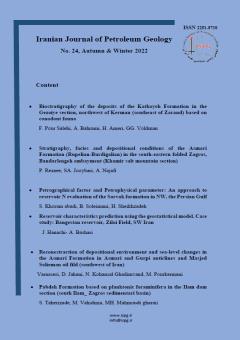One of the methods of harvesting oil reservoirs is the injection of nanoparticles. Nanoparticles increase oil recovery from reservoirs by changing wettability, reducing surface tension, reducing oil viscosity. Metallic nanoparticles (ceramic nanoparticles) have the high
More
One of the methods of harvesting oil reservoirs is the injection of nanoparticles. Nanoparticles increase oil recovery from reservoirs by changing wettability, reducing surface tension, reducing oil viscosity. Metallic nanoparticles (ceramic nanoparticles) have the highest application in increasing the absorption of reservoirs. In this research, changes in the contact levels of oil, water, and stone in the presence and absence of metal oxide nanoparticles have been investigated. The change in the rock's wettability has been analyzed in various concentrations of nanoparticles in the aqueous phase and the governing mechanism for changing the rock solidity in two metal oxide nanoparticles is presented. 4 nanoparticles used in this study are TiO2, NiO, Co3O4, Al2O3
The specimens were then measured by the DSA and the angles were measured and it was observed that the maximum gradient of the graph is related to nickel oxide followed by cobalt oxide and then titanium oxide and the lowest slope to aluminum oxide. In this respect, from this point of view, Nano particles are considered as NiO> Co3O4> TiO2> Al2O3, respectively. So the first suggestion is to select the most suitable nanoparticles of metal oxide, NiO, and for the second position Co3O4, the third and fourth choices are TiO and Al2O3, respectively.
Manuscript profile


